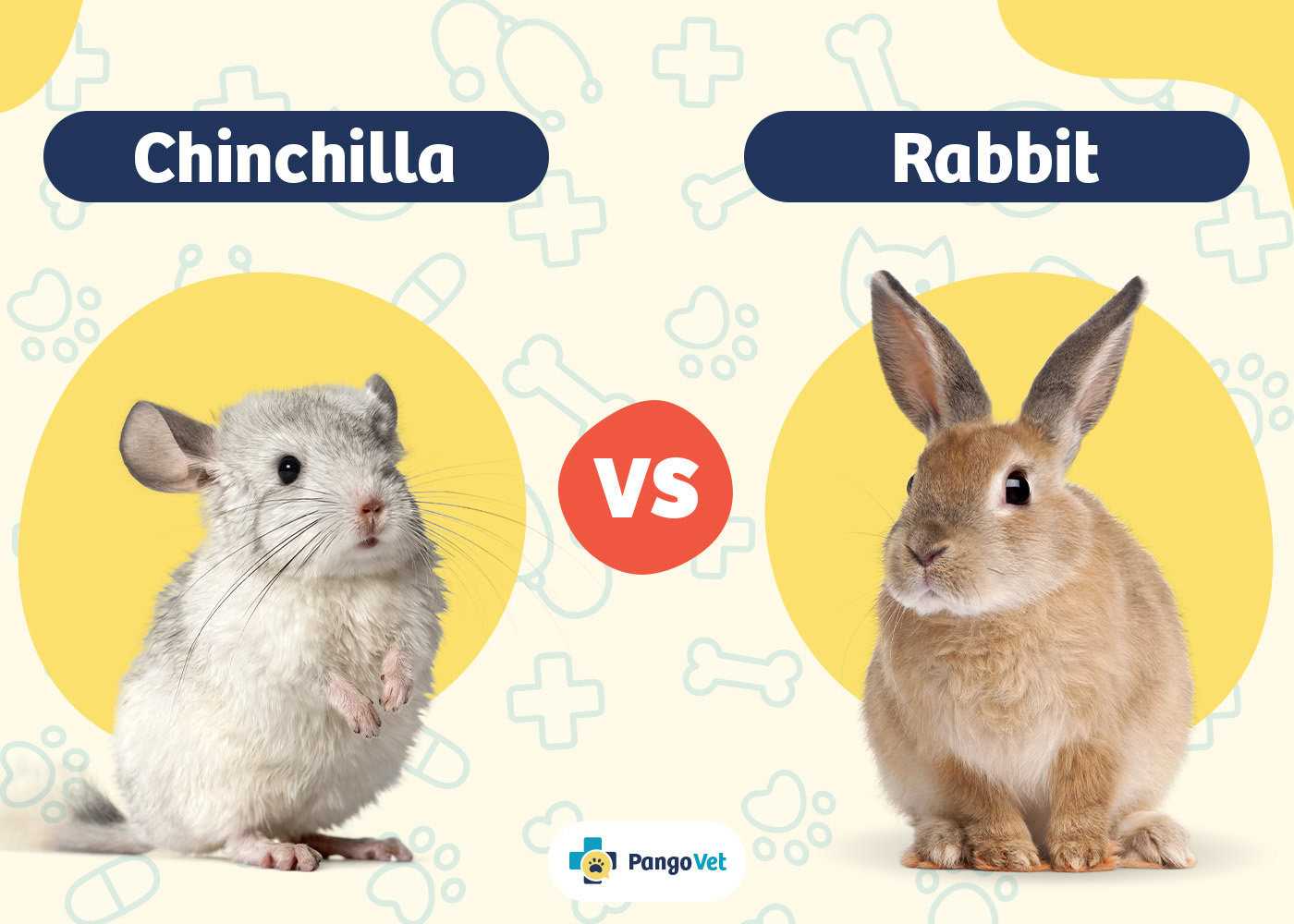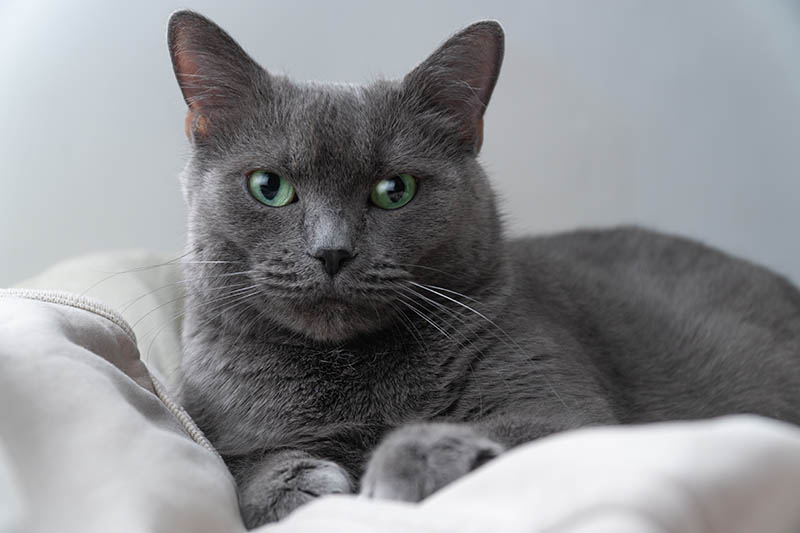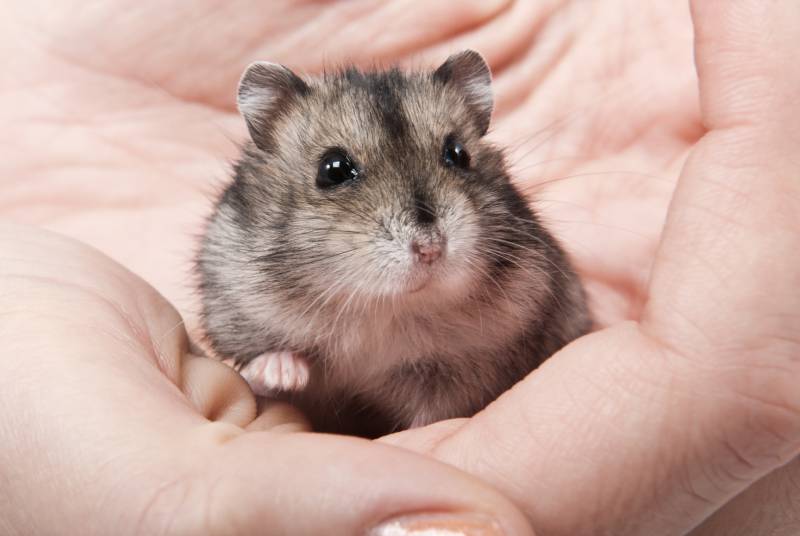VET APPROVED

The information is current and up-to-date in accordance with the latest veterinarian research.
Learn more »Click to Skip Ahead
If you want an adorable and cuddly family pet, but bringing a dog or cat home doesn’t fit your family, then a chinchilla or a rabbit can be an excellent alternative. These animals are cute and fluffy, and they make excellent pets.
However, while both make great pets, they’re not necessarily ideal for every household. If you’re trying to decide between the two animals, the guide below will walk you through all the things to consider before adopting one or the other.
We’ll look at everything from which one is more expensive to own to which one is easier to care for. After all, there’s no point bringing home either pet if they won’t fit into your existing budget or lifestyle.

Visual Differences
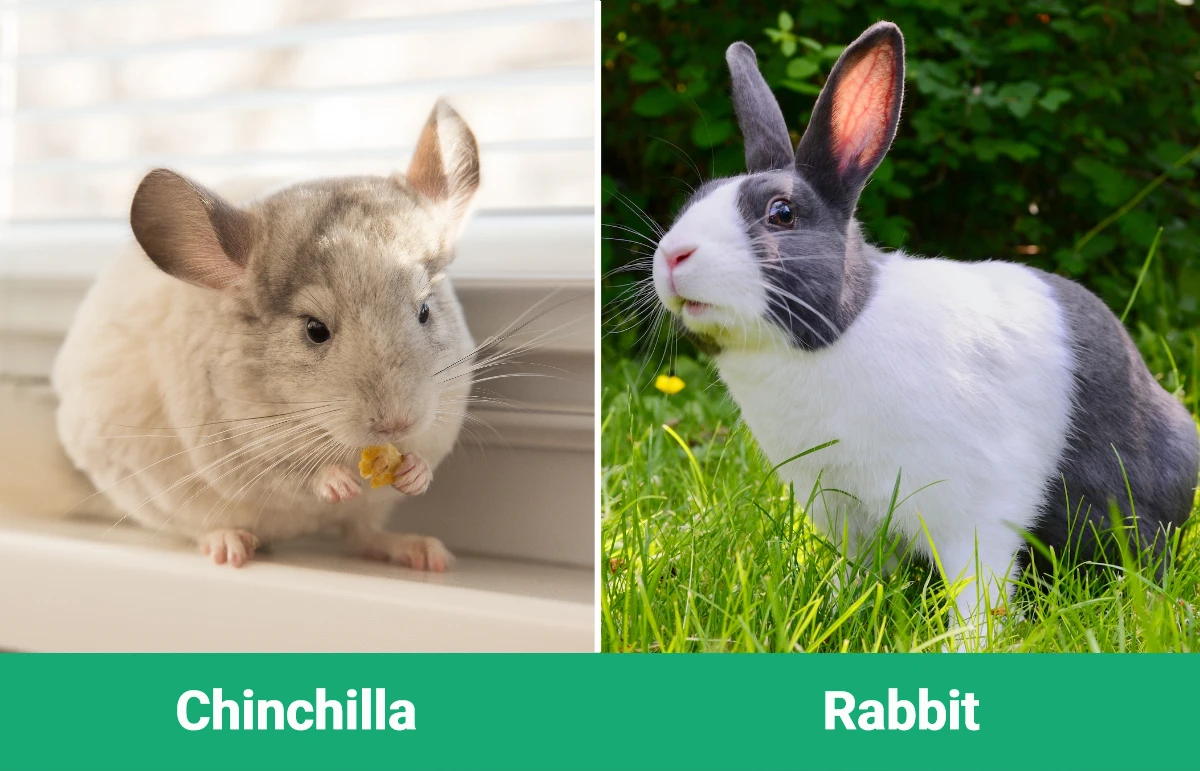
At a Glance
- Average length (adult): 9-14 inches
- Average weight (adult): 1-1.75 pounds
- Lifespan: 10-15 years
- Exercise: 2+ hours a day
- Grooming needs: Moderate
- Family-friendly: Yes, but not ideal for homes with small children
- Other pet-friendly: Not with pets perceived as predators
- Trainability: Possible, but requires a great deal of work
- Average length (adult): 14 – 19 inches, depending on the breed
- Average weight (adult): 2 – 16 pounds, depending on the breed
- Lifespan: 8-12 years
- Exercise: 3+ hours a day
- Grooming needs: High
- Family-friendly: Yes
- Other pet-friendly: Not with pets perceived as predators
- Trainability: Medium

Chinchilla Overview

These tiny little animals are extremely cute and cuddly, and it won’t take long before you’re head over heels for one.
Unfortunately, though, many people find their appearance irresistible and adopt one without having the slightest clue how to care for them. That often leads to the animals being neglected or poorly cared for.
It’s important to educate yourself on everything that will be expected of you as an owner before adopting a chinchilla.
Personality / Character
Chinchillas are curious creatures, but they’re also naturally shy. It may take time before yours will warm up to you, but your odds of forming a tight bond are better if you adopt them when they’re still quite young, so they can acclimate to your presence.
They can be taught to allow being petted, but chances are that they’ll never enjoy being picked up. They have delicate ribcages, so it’s best if you leave them on the ground. For that reason, they’re not ideal pets for families with small kids.
It’s also important for you to realize that chinchillas are nocturnal. They can be extremely active late at night, and you should be prepared to lose a little shuteye if you’re a light sleeper. That also means that they may prefer to snooze during the day when you’d most like to play with them.
They also prefer the safety and security of their cages, especially when the setup mimics their natural environment with plenty of places to hide and climb. While they benefit greatly from daily, supervised out-of-cage time in a chinchilla-proofed space, they’re unlikely to roam freely or confidently across large, unfamiliar areas. Their preference for shelter and their cautious nature reflect their instincts as prey animals.
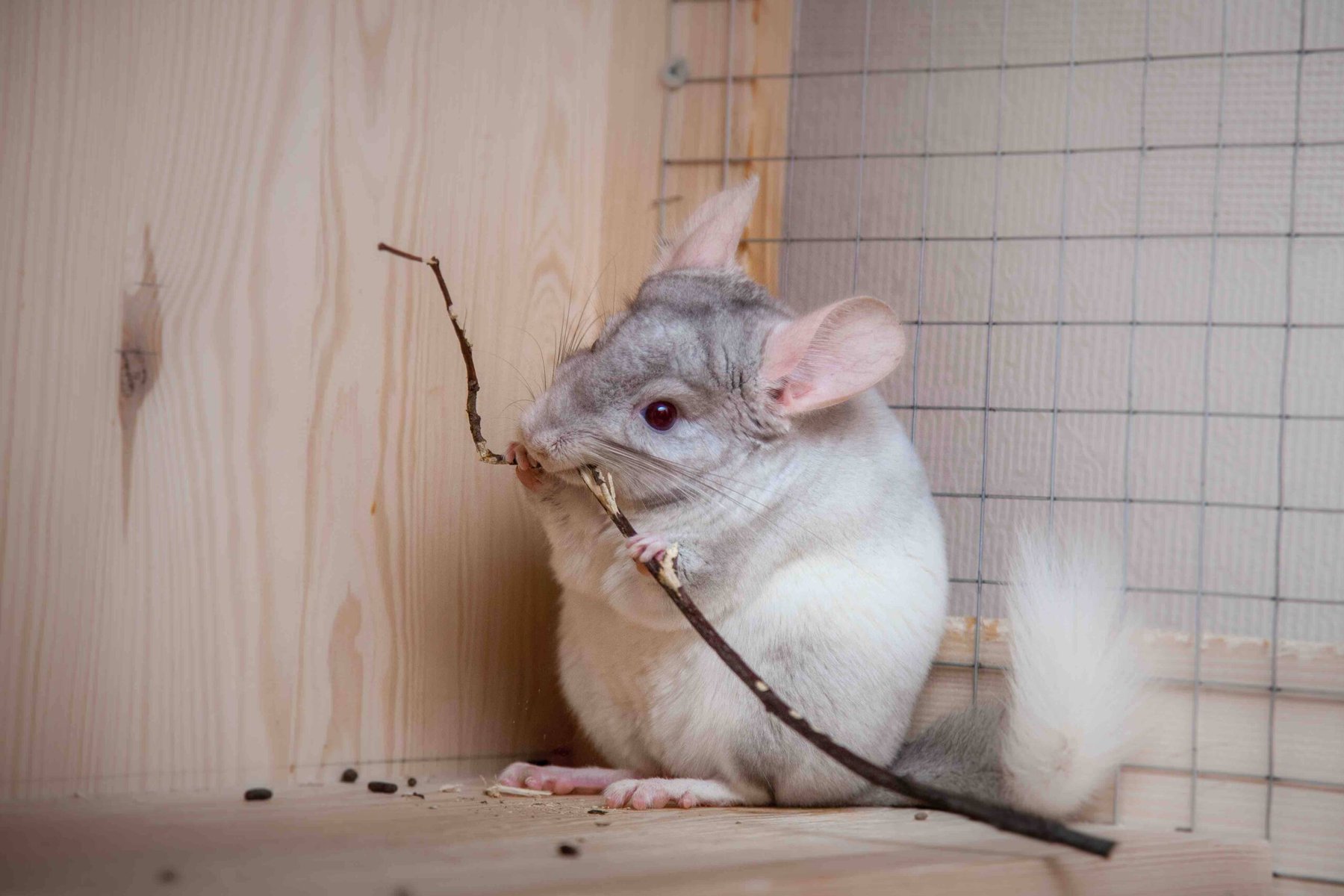
Health & Care
Caring for a chinchilla is very different from most other pets, and it’s not as simple or intuitive as you might expect.
They need a regular supply of both pellets and hay for food, and you should also give them something that they can gnaw on. Their teeth grow constantly, and they need to file them down, or else it could lead to serious health issues.
Chinchillas need a large habitat with plenty of vertical space. These animals are incredible jumpers, and you’ll need to give them plenty of room to do so. The ideal indoor temperature range is 50 to 60°F, and you should clean the cage at least once a week.
They’ll also need a dust bath every day. Leave the pan filled with dust for around 10–20 minutes, and your chinchilla will instinctively know what to do. This helps redistribute their natural oils and keep both their skin and fur soft.
Your new pet will also need multiple toys to keep them occupied, as well as plenty of cardboard boxes, as they love to hide in them.
Suitable for:
Chinchillas can be excellent pets for anyone who wants a creature that is fun to watch and relatively long-lived.
However, they’re not good for homes with children who aren’t old enough to handle them with care. These creatures are fragile, and they need constant supervision when interacting with a child.
- Incredibly adorable
- Predictable
- Active and fun
- Most active at night
- Fragile

Rabbit Overview

Rabbits are more “traditional” pets, and owning one is more common. As a result, you may be more familiar with how to care for one, but even so, it’s a good idea to do your homework before adopting one.
It’s also important to realize that there are many different types of rabbits, and they can all have needs specific to the breed. Rabbits can range from tiny little Netherland Dwarfs to massive Flemish Giants, and they won’t all be equally good fits for your lifestyle.
Personality / Character
Most people don’t realize it, but rabbits are very intelligent creatures. They also have complex personalities and are true individuals, so if you own multiple bunnies, you’ll likely find that they all express themselves in different ways.
Many rabbits act similarly to cats and dogs in some ways. They’ll gladly sit in your lap and accept affection, and they often go wild when their owners come home after a long day.
Rabbits love to be set free from their cages, and they’ll happily explore your entire home — often at high speeds. As a result, you need to be absolutely certain that your home is bunny-proofed, and you shouldn’t have other pets that might view your rabbit as a meal on wheels.
They’re also more outgoing than chinchillas. This makes them better pets for families with kids, but you still need to supervise your children around them to make sure they aren’t mishandled. If you want a pet that will interact with you on a regular basis, a rabbit might be the better choice.
Health & Care
Rabbits are extremely active creatures. However, many people find that their pet rabbits do little more than sit in their cage and eat all day.
That’s not a good thing. If your rabbit isn’t active for at least a few hours a day, they’re likely depressed and possibly on their way to becoming overweight. They should spend at least 3 hours per day out of the cage; this should be enough to let them run around a bit and stretch out.

Many people choose to let their bunnies have free rein inside the house. If you choose to do this, though, it’s imperative that you make sure your house is safe for them and that there are no ways for them to escape.
However, if you want to keep yours penned up some of the time, you’ll need to invest in a large cage or bunny condo. The habitat should be kept in an area where they’ll be close to family members, as rabbits are social creatures, and it needs to be big enough that they can hop around without feeling constrained.
You’ll need to give your rabbit fresh hay every day, and this should make up the bulk of their diet. You can also give them veggies and fiber pellets, but they need the hay to help grind down their teeth. They’ll also need plenty of toys to keep them occupied.
Suitable for:
Rabbits are versatile pets, and they can fit in well with just about any household. However, keep in mind that bunnies are considered prey animals, so if you already have a cat or dog, these species don’t mix well. Even if your other pets seem calm, the presence of a predator can cause chronic stress for a rabbit.
Rabbits are hardier than chinchillas and more outgoing, so they can handle homes with small children. They can also make a great starter pet for younger kids who are ready to take the responsibility of caring for a pet. Just make sure to always supervise your kids with the rabbit to ensure that they’re treated well.
- Sociable and outgoing
- May be quite affectionate
- Can be trained to use litter boxes
- Need tons of exercise
- Can be ill-tempered

Which Pet Is Right for You?
Both rabbits and chinchillas can make wonderful companions in the right environment. While they may seem similar at a glance, they have very different needs and temperaments, so it’s important to consider which animal best fits your lifestyle and expectations.
Chinchillas are gentle and sensitive animals. They tend to be more reserved and prefer quiet surroundings. While they can form bonds with their caregivers, they may not enjoy being handled frequently. Their care is relatively straightforward, but their delicate nature makes them better suited for calm, adult-only households.
Rabbits, on the other hand, are generally more interactive and expressive. They can be affectionate and curious, and many enjoy companionship and playtime with their caregivers. However, they also require daily enrichment and social interaction, as well as a commitment to their housing, diet, and healthcare needs.
Ultimately, neither is a “better” pet, only different. If you’re looking for a quiet observer who prefers a peaceful routine, a chinchilla might be a good match. If you’re hoping to build a closer, more hands-on relationship, have small kids, and can meet their social needs, a rabbit may be the better choice.
The most important thing is to choose the pet whose natural behavior and needs align best with your home, time, and expectations.
See also:
- Bunny vs. Rabbit: Is There a Difference? Facts & FAQ
- Wild vs. Domestic Rabbits: Differences Explained (With Pictures)
Featured Image Credit: Top – webandi, Pixabay | Bottom – FiledIMAGE, Shutterstock
